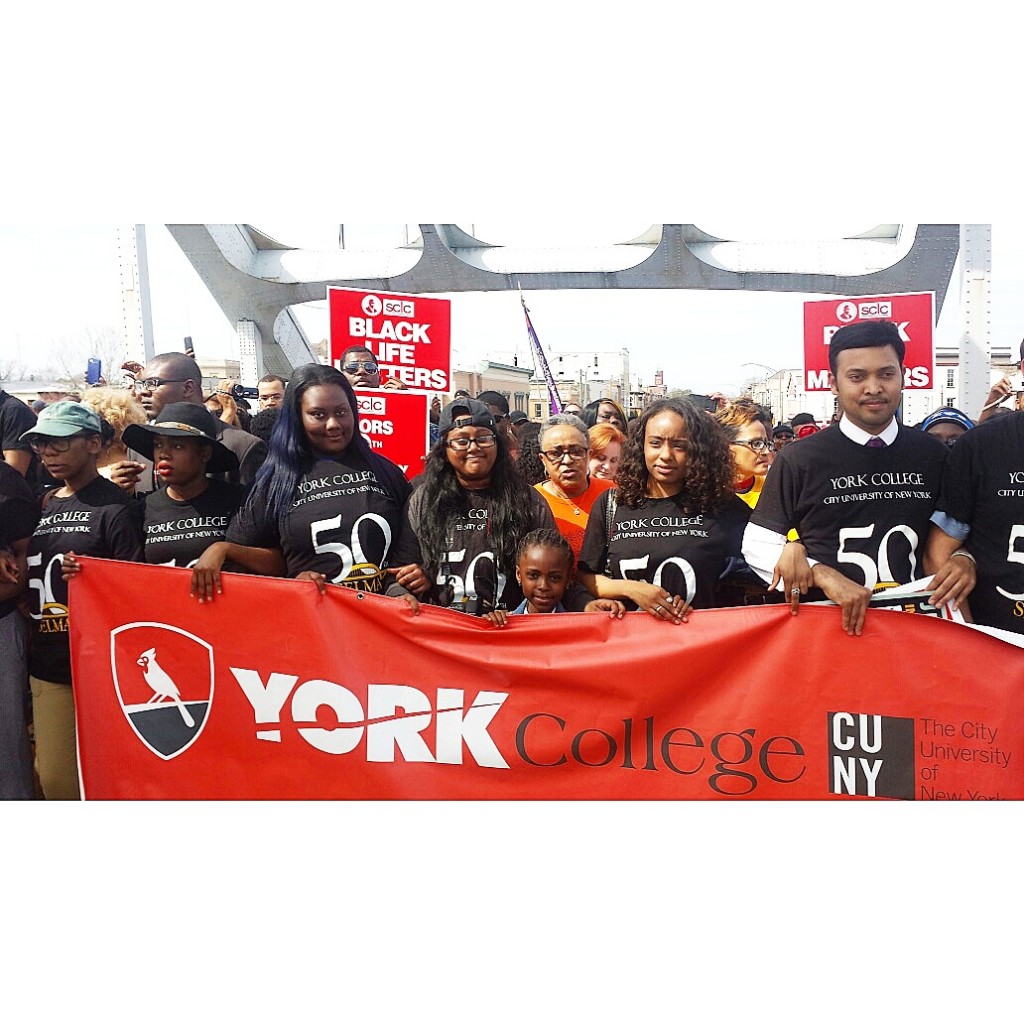
Twenty-five York College students traveled by bus for twenty-two hours to Selma, Alabama, to commemorate the 50th Anniversary of Bloody Sunday. While the celebration is to honor those who fought for equal rights for blacks, some Selma residents still struggle with poverty.
Some officials attributed the poverty in the black community to the lack of public and private investments.
“The older people are going to have to die and the younger people are gonna have to educate themselves to save Selma,” said Michael Jackson, the only black district attorney in Alabama. Jackson believed that intra-racism contributes to the poverty in Selma. “Most public institutions are still segregated. Most of the Caucasians are taking their money elsewhere instead of investing in the city.”
“Whites make more money than [blacks] and yes, it is because of systemic racism. White people, [Selma] needs your money, ” said Dr. Iyelli Ichie-Hanks, research director of Live Unchained.
Alabama Possible statistics confirmed that Selma ranks 49th worldwide on the poverty list. Nearly 60 percent of children dwelling in Selma’s Dallas County live in poor conditions, below the federal poverty line. The amount of people living in poverty in Selma increases by 36.8 percent every year.
Councilman Michael Johnson of Selma’s Ward 8, offered a contrasting point of view to the plight and solution to Alabama’s poverty.
“The problem with black folks is they need to stop waiting for people to give them things. We need skilled people,” said Johnson. “Racism has gotten a lot better in Selma. Blacks own a lot of small businesses now, but that’s because they have the education behind it. White folks take their education seriously, and that’s what we need to see as a [community].”
Johnson noted that there is still minor tension between whites and blacks in Selma. “I’m hoping now with the 50th Anniversary people will see we need help. Not only from whites, but any wealthy person willing to contribute,” said Johnson.
Although some York students knew about Selma’s history, the poverty-stricken communities were a culture shock to them.
“Selma is doing bad because there aren’t any big businesses to provide the people with jobs,” said Shavonique English, a sophomore health administration major. “The United States acts like they’re a perfect country, but cities in poverty like Selma get put on a back burner.”
Senior sociology major, 25-year old Ameila Rampershaud, believed the only way for one to truly appreciate Selma is to experience it.
“[Poverty] stems from systemic racism. Colored people did not have the advantages whites did and it did not change drastically,” Rampershaud said. “You see and hear about how poor [blacks] in Selma are on television, but when you actually come, you can feel how hard they fought.”
Deuel Ross, a member of the Legal Defense Fund for the NAACP, believed racially polarized voting is a contributing factor of poverty in Selma.
“Some black people vote for blacks candidates and vice-versa. This is what causes tension between blacks and whites,” said Ross. “People don’t hear what other candidates may have to offer because they’re too worried about skin color.”
“Race doesn’t have anything to do with it,” said York’s Student Government President Shaikh Amin. “Selma has big people that support them like John Lewis and Al Sharpton, but they have to learn to elect leaders who will get a job done.” Amin believed that Selma residents need to come together and reestablish a strong infrastructure and adapt wiser voting techniques.
Reverend William Barber preached about dirty politics leading to poverty at Brown Chapel.
“If you’re concerned about poverty, you have to be concerned about voting rights. Politicians put their hands on the Bible, but their hearts are far from it,” Barber said.
The first and only black female lieutenant in Selma, Natasha Fowlkes attributed Selma’s poverty to the small businesses. “Crime rate is very low in Selma because people work so hard in their little businesses, that they don’t have time to commit any crime,” said Fowlkes.
Political science major Shavon Richards believed that Selma’s poverty derives from politics.
“We have to look past racism and look at the residents who regulate the cash flow in Selma. One of the ways to create change is to pay attention to the law and noticing how it affects the poor,” Richards said.
Long time residents expressed cynicism about changes in the state of poverty and race relations.
68-year old Donna Patterson said, “I’ve lived in Alabama my entire life. I’ve witnessed change, but I’ve also seen racism and I still see it. If [blacks and whites] don’t get along, how can anything be done in politics? If blacks can’t come together in Selma, how can there be a big change?”
“I am very grateful [York students] got to see how much people sacrificed their lives and fought for their rights,” said Amin. “I see students in York take certain opportunities for granted, but coming to Selma showed us we should appreciate the little things. Not only did we touch history, but we’re now part of it, too.”


